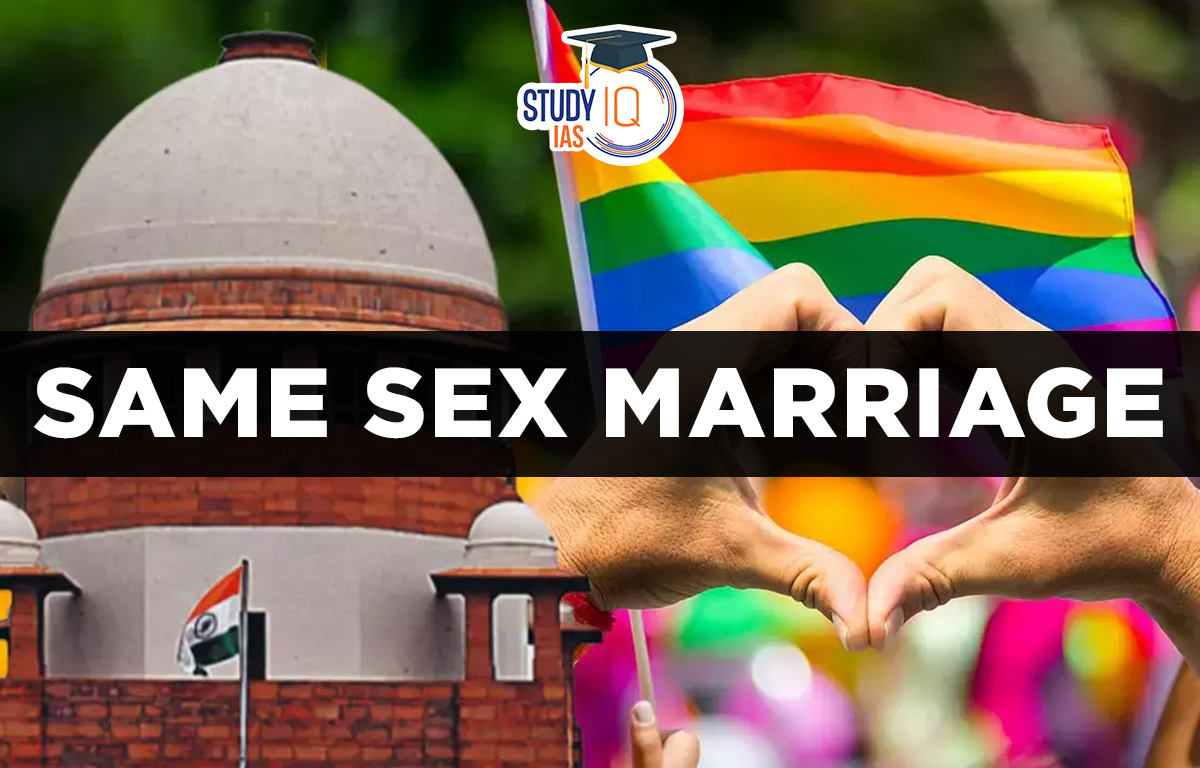Table of Contents
Key Developments in Same-Sex Marriage Verdict
- A five-judge bench comprising Justices BR Gavai, Surya Kant, BV Nagarathna, PS Narasimha, and Dipankar Datta reviewed the petitions in chambers.
- The bench concluded:
- No “error apparent on the face of the record” in the 2023 judgment.
- The ruling aligns with legal principles and does not require interference.
- Reiterated there is no constitutional basis for granting legal recognition to same-sex unions.
- Emphasized that legislative reforms, if needed, must be initiated by Parliament.
- Dismissed the notion of a fundamental right to marry.
- Petitions argued the judgment was “self-contradictory” and unjust but were dismissed.
2023 Judgment of Same-Sex Marriage
- Bench Composition: It was delivered by a five-judge Constitution Bench.
- Result: 3-2 judgment rejecting same-sex marriage recognition and civil unions.
- Majority Opinion (3 Judges) – Key points:
- The Special Marriage Act, 1954 (SMA) cannot be judicially amended to recognize same-sex unions.
- Changes to marriage laws are under the purview of Parliament, not the judiciary.
Minority Opinion (2 Judges)
- Civil unions: Proposed as a distinct legal framework granting same-sex couples certain rights and responsibilities akin to marriage.
- The then CJI Justice Chandrachud argued that the freedom to enter into a union is traceable to Part III of the Constitution, including rights to: Equality, Privacy & Dignity.
What is Same-Sex Marriage?
- Same-sex marriage is the marriage of two people of the same sex.
- As of 2023, marriage between same-sex couples is legally performed and recognized in 34 countries, with the most recent being Andorra.
- Same-sex marriage is not legally recognized in India, and the existing marriage laws, such as the Hindu Marriage Act and the Special Marriage Act, only recognize marriages between a man and a woman.
- However, it should be noted that the Special Marriage Act uses gender-neutral terms as Section 5 says “a marriage between any two persons may be solemnized under this Act”.
- Similarly, Section 5 of the Hindu Marriage Act mentions marriage between “any two Hindus”.
Same-Sex Marriage in India
Same-sex marriage is the union between two individuals of the same gender, typically two men or two women. While it has been legalized in 34 countries, including Andorra, encompassing around 17% of the global population, it remains constrained by legal, religious, and cultural norms in many places. Advocates argue that non-recognition of same-sex marriage amounts to discrimination against LGBTQ+ couples, pushing for equal protection under existing marriage laws, such as the Special Marriage Act of 1954.
However, the Indian government opposes such recognition, viewing marriage as a sacred union between a biological man and a biological woman. Legalizing same-sex marriage has the potential to impact society from the individual to the community and beyond.
Same-Sex Marriage Background
- Navtej Singh Johar v. Union of India Case: SC struck down part of Section 377 stating that choosing a partner is every persons’ Fundamental Right.
- The choice of whom to partner, the ability to find fulfilment in sexual intimacies and the right not to be subjected to discriminatory behaviour are intrinsic to the constitutional protection of sexual orientation.
- Article 21 guarantees the right to life and liberty.
- However, it only recognised an LGBTQIA+ person’s ‘right to love’, it did not recognize their ‘right to marry’.
- Hindu Marriage Act (HMA): Personal affairs such as marriage and divorce are governed by laws specific to communities in India.
- HMA applies to Buddhists, Sikhs, Jains, and all the sects of Hinduism. HMA does not distinguish between heterosexual and homosexual marriages.
- Special Marriage Act: Section 4(c) of the Special Marriage Act, 1954, discriminates against same-sex couples. The provision only recognises marriage between a ‘male’ and a ‘female’.
Legality of Same-Sex Marriage in India since Ancient Time
Ancient India
- Text: As far back as 400 BC, the Kama Sutra written by Indian philosopher Vatsyayana, describes homosexual acts in detail, including explicit instructions on how to perform such acts.
- Tamil texts: Tamil Sangam literature from 3 BC to 4 AD, included descriptions of man-on-man relationships and relationships between transgender people.
- Other ancient texts like the Arthashastra, Nardasmriti, and Sushruta Samhita also mention different types of same-sex relationships.
- However, Manusmriti derided the same.
- Architecture: The walls of ancient architecture are the second source of information about ancient India’s thoughts on sexuality.
- Temples of Khajuraho depict same-sex relationships and bisexual relationships, as well as other acts.
Medieval India
- During Mughal rule, “unnatural intercourse” was prohibited under the Fatawa Alamgiri, a unified code of guidance based on Sharia law.
Pre and Post Independence
- Section 377 of the IPC (Pre-Independence)
- The law allowed the judiciary to “punish” LGBT individuals with up to 10 years in jail as well as a fine.
- Section 377 would continue to stay in effect till 2001 when the Naz Foundation filed a Public Interest Litigation (PIL) challenging the clause as violative of the fundamental right against discrimination enshrined in the Constitution of India.
Same-Sex Marriage Judgment Timeline
| Date | Event |
| March 12, 2023 | Centre opposes same-sex marriage before the SC |
| March 13, 2023 | SC refers the case to a Constitution Bench |
| April 1, 2023 | Jamiat Ulama-I-Hind opposes the pleas |
| April 6, 2023 | DCPCR supports same-sex marriages |
| April 15, 2023 | The composition of the five-judge bench is notified |
| April 17, 2023 | Centre files a new application questioning pleas’ maintainability |
| April 17, 2023 | NCPCR suggests limited exposure for children raised by same-sex parents |
| May 11, 2023 | The constitution bench led by Chief Justice Chandrachud reserves its verdict |
| October 17, 2023 | SC refuses to give marriage equality rights to the LGBTQIA+ community in India under Same-Sex Marriage Verdict |
Arguments For and Against Same-Sex Marriages
Arguments for Same-Sex Marriages
- Equality: All individuals should have the same rights and opportunities, including the right to marry the person they love, regardless of their sexual orientation or gender identity.
- Love and Commitment: Allowing same-sex couples to marry recognizes and affirms these relationships.
- Social Acceptance: Legalizing same-sex marriages sends a message of social acceptance and inclusion, and can help reduce stigma and discrimination against the LGBTQ+ community.
Arguments against Same-Sex Marriages
- Traditional definition: Marriage has traditionally been defined as a union between a man and a woman, and changing this is seen as undermining the institution of marriage.
- Religious Beliefs: Same-sex marriages go against the teachings of many religions, and legalizing them would infringe on the religious freedom of those who oppose them.
- Parenting: Legalizing same-sex marriages is believed to harm children’s psyche.
- Slippery Slope: Legalizing same-sex marriages could lead to the recognition of other non-traditional forms of relationships, such as polygamy or incest.
LGBTQIA+ Community in India
The Constitutional status of the LGBTQ+ community in India has been a topic of debate and struggle for many years.
- Prior to 2018, Section 377 of the Indian Penal Code criminalized homosexual acts, making it illegal to engage in same-sex sexual activity.
- This was upheld by the Supreme Court as constitutionally valid in Koushal v. Naz Foundation (2013).
- This provision was struck down by the Apex Court of India in September 2018 in a landmark judgment, Navtej Singh Johar v. Union of India, which decriminalized consensual same-sex relationships.
- However, there is no specific constitutional protection for the community in India. The Indian Constitution does not explicitly mention sexual orientation or gender identity as protected characteristics, nor does it provide explicit anti-discrimination protections based on these characteristics.
- The Supreme Court has made several judgments in recent years that recognize the rights and dignity of LGBTQ+ individuals. For example:
- National Legal Services Authority v. Union of India (2014): This landmark judgment recognized transgender people as a third gender, and directed the government to take steps to provide them with legal recognition, provide access to education, employment, and healthcare services and protection from discrimination.
- S. Swapna v. Government of Kerala (2015): In this case, the Supreme Court ordered the Kerala government to provide transgender people with access to healthcare facilities and to establish separate prison facilities for them.
Constitutional Provisions for Protection of LGBTQ+ Community
- Right to Equality: Article 14 of the Constitution guarantees the right to equality before the law and the equal protection of the law to all individuals, regardless of their sex, caste, religion, or place of birth. The Supreme Court has interpreted this provision to include sexual orientation as a protected ground.
- Right to Non-Discrimination: Article 15 of the Constitution prohibits discrimination on the grounds of religion, race, caste, sex, or place of birth.
- Right to Freedom of Expression: Article 19(1)(a) of the Constitution guarantees the right to freedom of expression to all individuals. This provision can be used to protect the rights of LGBTQ+ individuals to express themselves and advocate for their rights.
- Right to Life and Personal Liberty: Article 21 of the Constitution guarantees the right to life and personal liberty to all individuals. The Supreme Court has interpreted this provision to include the right to live with dignity, which includes the right to make choices about one’s sexuality and gender identity.
- Right to Privacy: The Supreme Court has recognized the right to privacy as a fundamental right under the Constitution. This includes the right to make choices about one’s sexual orientation and gender identity without fear of discrimination or harassment.
| Other Important Terms to Know | |
| Constitution Bench |
|
| Division Bench |
|
| Single-judge Benches |
|
Same-Sex Marriages in Other Countries
- An LGBTQ advocacy group’s report says that only 32 countries around the world recognise same-sex marriage.
- In the majority of countries that allow same-sex marriage, marriage equality was introduced by legislation. Such marriages by court rulings were recognised in only 10 countries.
United States
- The Supreme Court of the US recognised same-sex marriages in a 5:4 ruling in 2015. It said that limiting marriage solely to heterosexual couples violated the 14th Amendment guarantee of equal protection under US law.
- Nation-wide legalization of same-sex marriages took place based on the decision. Before the ruling, 32 states had already recognised same-sex marriage.
Netherlands
- Netherlands was the first country in 2001 to legalize same-sex marriage by amending one line in its civil marriage law.
Australia
- Australia’s Parliament passed a law recognising same-sex marriage following a nationwide referendum (62% support) in 2017.
Ireland and Switzerland
- A formal recognition of LGBTQ marriages took place following a popular vote by the majority.
South Africa
- South Africa, in 2006, became the first African country to legalize same-sex marriages following a decision by the highest court in the land.
Taiwan
- Taiwan became the first Asian country to recognise same-sex marriage in 2019. The country’s parliament brought legislation following a court ruling in 2017.
Argentina
- Argentina became the first Latin American country and the 10th country in the world to legalize same-sex marriages nationwide in 2010.
Canada
- Same-sex couples in Canada have enjoyed the legal benefits of marriage since 1999 when the federal and provincial governments extended marriages under the Common Law to LGBTQ couples.
- Same-sex marriages were made legal in nine of Canada’s 13 provinces and territories in 2003.
- Canada’s Parliament formally recognised same-sex marriages by passing nationwide legislation to this effect.


 Serious Fraud Investigation Office (SFIO...
Serious Fraud Investigation Office (SFIO...
 Article 142 of Indian Constitution, Sign...
Article 142 of Indian Constitution, Sign...
 Pakistan-Occupied Kashmir (PoK): History...
Pakistan-Occupied Kashmir (PoK): History...





















